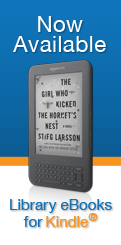 Kindle books have arrived at an OverDrive library near you! Or they will any minute now. The two libraries I have access to (I only moved in June, my old library card hasn’t expired yet) both have it.
Kindle books have arrived at an OverDrive library near you! Or they will any minute now. The two libraries I have access to (I only moved in June, my old library card hasn’t expired yet) both have it.
Does it work? Yes, it works. I tried it, and got an ebook. It works for Kindle apps, not just Kindles.
So, what does this mean?
This is a classic good news/bad news scenario. The good news is that more people will want to use the library’s resources. The good news is that more people will be aware that the library has something that they want. In the ereader marketplace, more than 70% of the market is owned by Amazon and its Kindle. And it’s a very big market. The Harris Poll released on September 19 shows that one in six Americans has an ereader. More than two-thirds of those ereaders are Kindles. Until this week, Kindle owners were unserved by libraries, today they aren’t. That’s a big influx of users into an already rising tide.
The other huge part of this is mindshare. When most people see someone using an ereader, they automatically think “Kindle”, no matter what the device is. I have an iPad, and to most folks of the even slightly geeky persuasion, iPads are very different from Kindles. But in airports, people will still ask me, “Is that a Kindle?” To a lot of people, Kindles mean ebooks. Now that libraries serve Kindle books, we’ve arrived. We know we were already there, but this is a major PR moment that libraries can grab.
And we need to grab it, because this is going to have some…not so good impacts too. Ebook usage was already rocketing skyward in public libraries. Adding the huge number of Kindle owners to the borrower pool is going to send those numbers into the next galaxy. So this will increase demand on a finite supply. Not a finite supply of bits and bytes, but a finite supply of dollars and cents. Library budgets have been slashed everywhere. If demand for ebooks increases exponentially, that does not mean that demand for print books will decrease exponentially. Yes, it is possible, even probable that some users will switch from print books to ebooks if ebooks are available, but not everyone in every format.
We should use this opportunity to promote ourselves and get all the good spin out of this we can. Amazon certainly is. When a Kindle user selects the “Get for Kindle” option from the library’s OverDrive site, they go through a normal library checkout process, and then they are transferred to Amazon’s site for the download. When the user completes the download, what do they see? Other Amazon Kindle titles recommended for them to purchase, based on whatever they just downloaded from your library.
Today, Kindle users can borrow ebooks from their local library. The Harris Poll also confirmed previous studies that ereader owners read more books and buy more ebooks. Amazon gets the library borrowers out of the library site and onto the Amazon site in order to try to sell them more ebooks. There isn’t anything wrong with that. That’s why Amazon is in business in the first place. OverDrive finally gets to offer a Kindle option. That piece has been missing from their service for eons. This is a very big win for OverDrive.
And this is a big win for libraries. Not just because we can finally say “yes” when Kindle owners ask us if they can borrow ebooks. Saying “yes” is definitely better than saying “no”. But because being part of this revolution/evolution could be a way of getting focus on the library for something relatively cool, and we have a chance to leverage that focus into support.









One thought on “Kindle OverDrive”
Comments are closed.